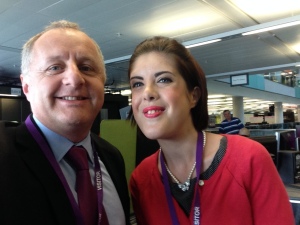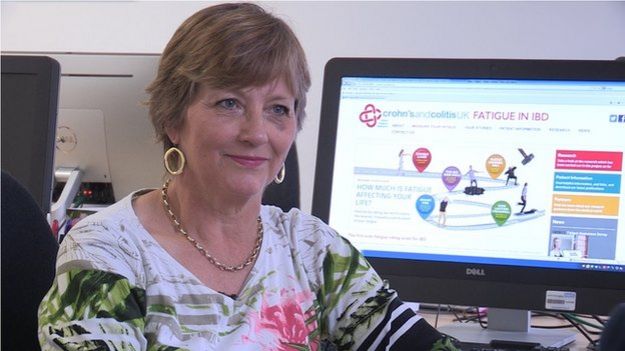Crohn's and Colitis UK member Rachel Flint appeared on BBC Breakfast along with the charity's CEO David Barker, where they saw a report by BBC Radio's Newsbeat programme for the first time. They were surprised at the content of the report, in which a doctor linked junk food to developing Crohn's Disease.
On her popular blog
Adventures of the Bag Lady, Rachel explains how the experience, and the aftermath affected her:
Within seconds of saying goodbye to [BBC Breakfast's] Louise and Bill I was inundated with texts, tweets and facebook messages. Me and the CEO of Crohn’s and Colitis UK David Barker stood in the green room staring at our phones as the messages flooded in from all over the country. Almost everyone was congratulating us on standing our ground, raising awareness for sufferers and talking about the illness in a “un-glossed” light.
 |
| Rachel and Crohn's and Colitis UK CEO David Barker |
But every single second my phone was buzzing with outrage over the junk food comments aired during the programme; which unfortunately myself and David were unprepared for as we sat down to face around 1.5M viewers on national TV.
As a journalist I’m used to being on the other side of the notebook/microphone, so being interviewed was a strange experience. I had no idea what they were going to ask me; so I suppose you could say I got a taste of my own medicine. But working in the media, I also know how the news works. Media outlets saw the new quote from Dr Sally Mitton’s interview on the Newsbeat segment and leapt on them. It was controversial and, “well news” (it was a new angle to the Crohn’s story) so the media ran with it.
Either through editing in the studio or Dr Mitton simply coming out with what she believed was a true, but damning and unfounded comment about junk food and Crohn’s; she told the world that sufferers were to blame for a lifetime of pain, ulceration and hospitalization. Which is out-of-order and, in my opinion, totally untrue.
To think that those with IBD cause their condition by eating burgers doesn’t ring true with me – you only have to say SIR STEVE REDGRAVE and that theory is halted entirely!
It didn’t end up being a bad day for Crohn’s and Colitis or those with stomas. In the end the controversial comment sent IBD spiralling to the top of the nation’s minds. Crohn’s was trending on twitter; advocates were posting informative blogs; people were sharing their experiences; and national organisations sent clarification statements to the national press to halt the misinformation quotes. I know that celebrity Carrie Grant sent a letter (see below) to the doctor in question advising her to get media training, and hundreds if not thousands complained to the BBC!

And if you want to know; despite everything that happened I really enjoyed being on the BBC. Yes, it was tough, scary and nerve-wracking. I only found out the night before and had to get up at 5.30am! But the crew were lovely and seemed genuinely interested in me and my condition. The toilets were not the best! But Louise, Bill and the whole crew really did everything they could to put us at ease. And it was a pleasure to meet David – who appears to be a great spokesperson for Crohn’s and Colitis UK.
Be sure to read the whole story over at Rachel's Blog
Here at Crohn's and Colitis UK, we worked tirelessly throughout the day and beyond to rectify this potentially damaging statement that the media picked up on. Read more about that
here.






 70% of young people in 2007 when surveyed by the charity stated "Fatigue” as their most noticeable symptom. As a result we won £500,000 from the Big Lottery Fund to investigate Fatigue further.
70% of young people in 2007 when surveyed by the charity stated "Fatigue” as their most noticeable symptom. As a result we won £500,000 from the Big Lottery Fund to investigate Fatigue further.







